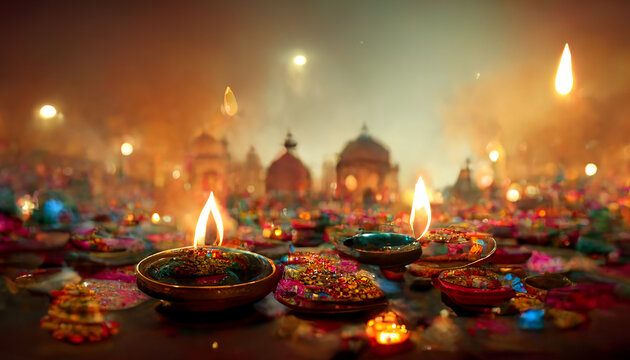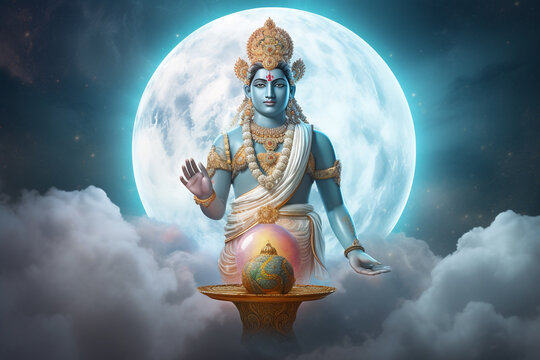Table of Contents

Dhanteras, also known as Dhantrayodashi or Dhanvantari Jayanti, marks the beginning of Diwali, the vibrant festival of lights. This auspicious day is dedicated to wealth, prosperity, and well-being, celebrated on the thirteenth lunar day of Krishna Paksha in the Hindu calendar month of Kartika. Rich in mythology and traditions, Dhanteras holds a special place in Hindu culture. Let us delve into the captivating stories, rituals, and modern practices that make Dhanteras a unique and meaningful festival.
The Etymology and Significance of Dhanteras
The name “Dhanteras” is derived from two Sanskrit words: “dhan,” meaning wealth, and “teras,” referring to the thirteenth day. According to ancient Hindu legends, this is the day when Goddess Lakshmi emerged from the ocean during the Samudra Manthan, the cosmic churning of the ocean. Believers hold that purchasing gold and other precious metals on Dhanteras will invite the blessings of Goddess Lakshmi into their lives, ushering in prosperity and good fortune.
The Mythology Behind Dhanteras
Emergence of Lord Dhanvantari

Adobe Stock Images
One of the most revered legends associated with Dhanteras is the appearance of Lord Dhanvantari, an incarnation of Lord Vishnu. During the Samudra Manthan, Lord Dhanvantari emerged from the ocean with a pot of Amrita (nectar of immortality) in one hand. This event symbolizes health and well-being, which are essential components of a prosperous life. The churning of the ocean itself is a metaphor for the arduous efforts required to achieve success and wealth, highlighting the divine blessings that come through hard work and perseverance.
The Tale of Hima’s Son

Another intriguing legend tells the story of the 16-year-old son of King Hima, who was foretold to die of a snake bite on the fourth day of his marriage. To thwart this fate, his wife kept him awake all night, surrounded by her gold jewelry and bright lamps, while singing to him. When Yama, the god of death, arrived disguised as a serpent, he was blinded by the brilliance of the lamps and jewelry and spent the night listening to the wife’s songs instead of entering the prince’s chamber. By morning, Yama departed quietly, sparing the prince’s life. This tale underscores the power of love, devotion, and intelligence in overcoming even the most daunting challenges.
Why We Do Laxmi Puja on Dhanteras

According to another legend, once upon a time, Lord Vishnu and Goddess Lakshmi visited Earth. Lord Vishnu instructed Goddess Lakshmi not to be tempted by earthly attractions. However, Goddess Lakshmi was enchanted by a farmer’s sugarcane field and enjoyed its juice. As a result, Lord Vishnu decreed that she must serve the farmer as a laborer for 12 years. During her stay, the farmer prospered immensely. When the farmer and his family later visited the river Ganga, Goddess Lakshmi revealed her true identity. The farmer, grateful for her blessings, pleaded for her to stay longer. Touched by his devotion, Goddess Lakshmi promised to visit him every year on Dhanteras and advised him to keep his house clean and light a lamp for her. This tradition of Laxmi Puja continues to this day.
This tale emphasizes the importance of gratitude and devotion in receiving divine blessings. The prosperity brought by Goddess Lakshmi’s presence in the farmer’s life illustrates how divine favor can transform one’s fortunes. The act of keeping the house clean and lighting a lamp symbolizes the need for purity and illumination to invite wealth and prosperity.
The Rituals and Celebrations of Dhanteras
Dhanteras involves a variety of rituals that focus on welcoming prosperity and positivity. One significant aspect is cleaning and decorating homes to welcome Goddess Lakshmi, symbolizing the removal of negative energies and inviting prosperity. Homes are adorned with colorful rangoli designs, flowers, and lights, creating an auspicious atmosphere. Purchasing new items, especially precious metals like gold and silver, is another key tradition. This practice is believed to bring good fortune and wealth, reflecting the belief that starting something new on Dhanteras leads to success and abundance. In the evening, homes are illuminated with oil lamps (diyas) to honor Goddess Lakshmi and Lord Dhanvantari. These lamps, placed at doorways and windows, ward off evil spirits and symbolize the triumph of light over darkness. The main event of the evening is the Laxmi Puja, where families worship Goddess Lakshmi with offerings of sweets, flowers, and fruits, chanting prayers to seek her blessings for wealth and prosperity. This ritual involves the entire family, bringing them together to express gratitude and seek divine favor.
Dhanteras also emphasizes health and well-being, dedicated to Lord Dhanvantari, the divine physician. People pray for good health, and some even visit doctors for check-ups, highlighting the importance of health in achieving prosperity. In some communities, it is considered an auspicious day to start new health routines, such as beginning new fitness regimens or consulting Ayurvedic doctors. Additionally, Dhanteras is a time for community bonding, where neighbors and friends exchange sweets and gifts, strengthening social ties and spreading joy. Community events and fairs are common, reflecting the importance of social connections and collective prosperity in Hindu culture.
As we wrap up our exploration of Dhanteras, a festival that beautifully blends mythology with tradition, we invite you, our readers, to be a part of our vibrant community at Mindbrews. If you have insights, stories, or personal experiences related to Dhanteras, or if there’s a particular aspect of this festival you cherish, please share them in the comments below. We value your contributions and enjoy learning from your unique perspectives.
For those inspired to dig deeper or contribute articles on cultural festivals, spiritual practices, or any topic that resonates with the spirit of Mindbrews, feel free to reach out to us at [email protected].